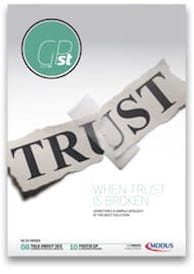WILD WEST PUBLISHING Getting an article or research paper accepted by a respected academic journal is a sought-after achievement for many doctors. But a recent sting operation by US journalist John Bohannon has raised some doubts about the process. He wrote a spoof medical paper full of easily detectable flaws and submitted it to 304 open access journals. A report in the BMJ revealed that more than half accepted the paper, leading Bohannon to declare “an emerging Wild West in academic publishing” with new journals profiting from the open access model in which authors, not readers, pay publication costs. Bohannon made up the names of authors and affiliations – including the flamboyantly named Ocorrafoo Cobange of Wassee Institute of Medicine – and submitted variations of a basic paper claiming to have found anticancer properties in a molecule extracted from a lichen. A number of journal editors have since promised to review their acceptance processes. Diary would like to hope its eagle-eyed publication editors would never let such errors slip through our net.
URINE THERAPY A spritely 91-year-old man believes he has found the elixir of youth – his own urine. Mark Ambrose, who lives with his partner in the south of Spain, told MailOnline that he drinks a glass of the stuff a day and also massages it into his skin. Mr Ambrose swears the unlikely supplement helps him look “no more than 65-70 years of age” and allows him to lead an active lifestyle. He’s been downing pee for three years after stumbling across the idea while searching the internet for a back pain cure. Advocates of urine therapy, which dates back to Biblical times, say the liquid can disinfect wounds and contains beneficial proteins, vitamins and minerals. Perhaps a remedy best recommended for only the most open-minded of patients. l
WHAT A FEELING Diary believes that all GPs should be encouraged to browse the “Reviews and ratings” section of the NHS Choices website. Although, perhaps not so much for those five-star ratings praising excellent clinical skills or courteous staff or waiting room musak that could inspire a flashmob. More bitter truth can be found in opinions offered at the lower end of the scale. Say for example: “On my last visit the doctor I saw was more interested in their own personal call on their mobile from their friend, did not seem interested in me and looked bored, was miserable and you could not fill the back of a postcard the amount of time they talked to me. I have never heard anything good said about this place and will look for somewhere else.” Even worse: “The doctors were rude, when I said there were a couple of things, was interrupted before I could go on and told to make another appointment. Bizarre! Do not bother registering here as you will regret it.”
BUMP AWAY THE GERMS Who needs nasty germ-infested handshakes when you can simply fist bump your fellow GPs instead? Doctors in the US are apparently considering using the unorthodox greeting to reduce the spread of infection. Research by surgeons at the West Virginia University found an old fashioned handshake exposes three times as much skin surface as pounding knuckles, with contact lasting almost three times as long. As expected, a shake also transmitted more bacteria. It’s not known where the fist bump originated, but it has been famously deployed by the likes of Barack Obama and even the Dalai Lama. It could yet prove to be a secret weapon in the war against germs.
CLASSIC CALLS Does your practice favour a catchy pop tune or something a little more upmarket to entertain callers while they wait? A survey has revealed Mozart is the top choice for local councils’ “on hold” music. Eine Kleine Nachtmusik and Symphony No 40 were the Mozart pieces deemed most suitable by local authority bosses, according to the Press Association. Selections from Debussy, Handel and Strauss were also popular, no doubt thanks to the fact these classics are out of copyright and can be played free of charge. Elsewhere, Lincolnshire County Council has reported that middle-of-the road pop songs by Simply Red and the Lighthouse Family are the most effective in keeping people on the line. The authority says the number of people hanging up while on hold has more than halved since it replaced traditional hold music with commercial tracks. However, the council did admit fault in its use of the Lighthouse Family’s Ocean Drive, describing the move as “a deplorable lapse in judgement.”
…AND HOUSE CALLS In the year 2012 Diary mourned the loss of the treasured TV series House – a medical drama that rewrote the classic diagnostic aphorism: “when you hear hoofbeats, don’t think of zebras”. Zebras were far too obvious for Dr Gregory House – consider the okapi or maybe the saola (one of the world’s rarest ungulates according to Wiki). Over eight series House diagnosed every obscure condition from Von Hippel–Lindau disease to alien hand syndrome. But the programme was not without some educational value in the real world it turns out. Doctors in Germany were baffled by a patient displaying a puzzling range of symptoms including hypothyroidism, oesophagitis, fever, increasing deafness, loss of sight and heart failure. He was then referred to the Marburg University clinic where medics noted that the case bore a striking similarity to one that featured on House in which a patient had been diagnosed with cobalt poisoning caused by debris from a metal hip replacement. Mystery solved.
This page was correct at the time of publication. Any guidance is intended as general guidance for members only. If you are a member and need specific advice relating to your own circumstances, please contact one of our advisers.
Read more from this issue of Insight Primary

Save this article
Save this article to a list of favourite articles which members can access in their account.
Save to library


